(完整)高考英语常用副词
- 格式:doc
- 大小:14.51 KB
- 文档页数:2
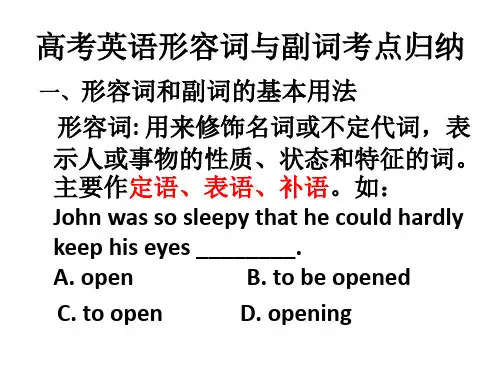
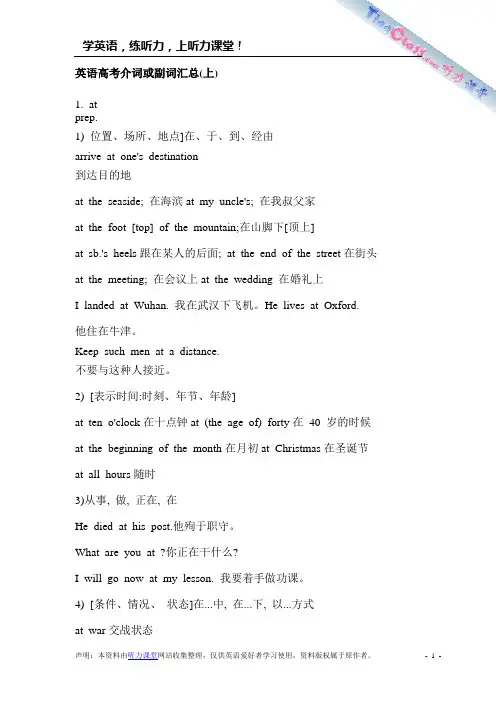
英语高考介词或副词汇总(上)1. atprep.1) 位置、场所、地点]在、于、到、经由arrive at one's destination到达目的地at the seaside; 在海滨at my uncle's; 在我叔父家at the foot [top] of the mountain;在山脚下[顶上]at sb.'s heels跟在某人的后面; at the end of the street在街头at the meeting; 在会议上at the wedding 在婚礼上I landed at Wuhan. 我在武汉下飞机。
He lives at Oxford.他住在牛津。
Keep such men at a distance.不要与这种人接近。
2) [表示时间:时刻、年节、年龄]at ten o'clock在十点钟at (the age of) forty在40 岁的时候at the beginning of the month在月初at Christmas在圣诞节at all hours随时3)从事, 做, 正在, 在He died at his post.他殉于职守。
What are you at ?你正在干什么?I will go now at my lesson. 我要着手做功课。
4) [条件、情况、状态]在...中, 在...下, 以...方式at war交战状态at its height 在最高点; 处于最盛时期; 处于高潮状态at your convenience在你方便时at attention 立正at ease 稍息at your pleasure随你方便, 由你决定at high pressure在高压下5) [动作的姿态, 常不译出]以, 用at a bound一跳, 一举at a gallop飞奔, 奔驰at a mouthful一口(就吞下) at every step每走一步6)[动作的目标、方向]向、对Aim straight at the mark.对准目标。
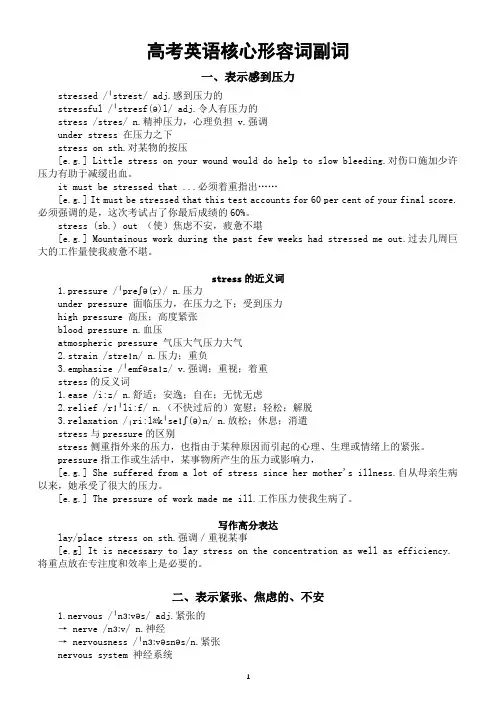
高考英语核心形容词副词一、表示感到压力stressed /ˈstrest/ adj.感到压力的stressful /ˈstresf(ə)l/ adj.令人有压力的stress /stres/ n.精神压力,心理负担 v.强调under stress 在压力之下stress on sth.对某物的按压[e.g.] Little stress on your wound would do help to slow bleeding.对伤口施加少许压力有助于减缓出血。
it must be stressed that ...必须着重指出……[e.g.] It must be stressed that this test accounts for 60 per cent of your final score.必须强调的是,这次考试占了你最后成绩的60%。
stress (sb.) out (使)焦虑不安,疲惫不堪[e.g.] Mountainous work during the past few weeks had stressed me out.过去几周巨大的工作量使我疲惫不堪。
stress的近义词1.pressure /ˈpreʃə(r)/ n.压力under pressure 面临压力,在压力之下;受到压力high pressure 高压;高度紧张blood pressure n.血压atmospheric pressure 气压大气压力大气2.strain /streɪn/ n.压力;重负3.emphasize /ˈemfəsaɪz/ v.强调;重视;着重stress的反义词1.ease /i:z/ n.舒适;安逸;自在;无忧无虑2.relief /rɪˈli:f/ n.(不快过后的)宽慰;轻松;解脱3.relaxation /ˌri:lækˈseɪʃ(ə)n/ n.放松;休息;消遣stress与pressure的区别stress侧重指外来的压力,也指由于某种原因而引起的心理、生理或情绪上的紧张。
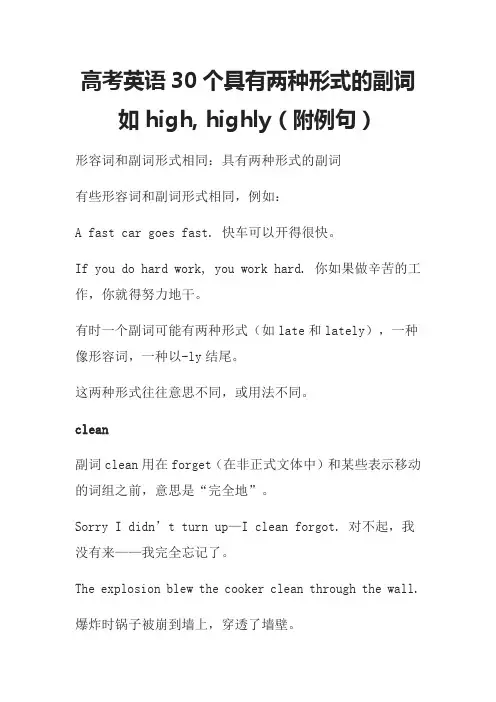
高考英语30个具有两种形式的副词如high, highly(附例句)形容词和副词形式相同:具有两种形式的副词有些形容词和副词形式相同,例如:A fast car goes fast. 快车可以开得很快。
If you do hard work, you work hard. 你如果做辛苦的工作,你就得努力地干。
有时一个副词可能有两种形式(如late和lately),一种像形容词,一种以-ly结尾。
这两种形式往往意思不同,或用法不同。
clean副词clean用在forget(在非正式文体中)和某些表示移动的词组之前,意思是“完全地”。
Sorry I didn’t turn up—I clean forgot. 对不起,我没有来——我完全忘记了。
The explosion blew the cooker clean through the wall. 爆炸时锅子被崩到墙上,穿透了墙壁。
dead在某些词组里,副词dead的意思是“的确”、“完全”或“非常”。
例如:dead ahead, dead certain, dead drunk, dead right, dead slow, dead straight, dead sure, dead tired。
请注意:deadly是形容词,意思是“致命的”。
表达这个意思的副词时fatally。
试比较:Cyanide is a deadly poison. 氰化物是一种致命的毒药。
She was fatally injured in the crash. 她在车锅中受了致命的重伤。
directdirect在非正式文体中常用作副词。
The plane goes direct from London to Houston without stopping.飞机由伦敦直飞休斯顿,中途不停。
50% cheaper—order direct from the factory! 便宜50%——直接从工厂订货吧!easyeasy在某些非正式的词组里用作副词。
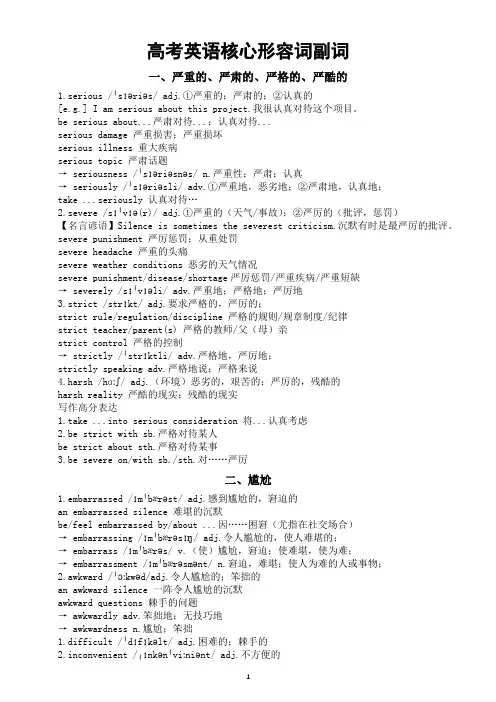
高考英语核心形容词副词一、严重的、严肃的、严格的、严酷的1.serious /ˈsɪəriəs/ adj.①严重的;严肃的;②认真的[e.g.] I am serious about this project.我很认真对待这个项目。
be serious about...严肃对待...;认真对待...serious damage 严重损害;严重损坏serious illness 重大疾病serious topic 严肃话题→ seriousness /ˈsɪəriəsnəs/ n.严重性;严肃;认真→ seriously /ˈsɪəriəsli/ adv.①严重地,恶劣地;②严肃地,认真地;take ...seriously 认真对待…2.severe /sɪˈvɪə(r)/ adj.①严重的(天气/事故);②严厉的(批评,惩罚)【名言谚语】Silence is sometimes the severest criticism.沉默有时是最严厉的批评。
severe punishment 严厉惩罚;从重处罚severe headache 严重的头痛severe weather conditions 恶劣的天气情况severe punishment/disease/shortage严厉惩罚/严重疾病/严重短缺→ severely /sɪˈvɪəli/ adv.严重地;严格地;严厉地3.strict /strɪkt/ adj.要求严格的,严厉的;strict rule/regulation/discipline 严格的规则/规章制度/纪律strict teacher/parent(s) 严格的教师/父(母)亲strict control 严格的控制→ strictly /ˈstrɪktli/ adv.严格地,严厉地;strictly speaking adv.严格地说;严格来说4.harsh /hɑːʃ/ adj.(环境)恶劣的,艰苦的;严厉的,残酷的harsh reality 严酷的现实;残酷的现实写作高分表达1.take ...into serious consideration 将...认真考虑2.be strict with sb.严格对待某人be strict about sth.严格对待某事3.be severe on/with sb./sth.对……严厉二、尴尬1.embarrassed /ɪmˈbærəst/ adj.感到尴尬的,窘迫的an embarrassed silence 难堪的沉默be/feel embarrassed by/about ...因……困窘(尤指在社交场合)→ embarrassing /ɪmˈbærəsɪŋ/ adj.令人尴尬的,使人难堪的;→ embarrass /ɪmˈbærəs/ v.(使)尴尬,窘迫;使难堪,使为难;→ embarrassment /ɪmˈbærəsmənt/ n.窘迫,难堪;使人为难的人或事物;2.awkward /ˈɔːkwəd/adj.令人尴尬的;笨拙的an awkward silence 一阵令人尴尬的沉默awkward questions 棘手的问题→ awkwardly adv.笨拙地;无技巧地→ awkwardness n.尴尬;笨拙1.difficult /ˈdɪfɪkəlt/ adj.困难的;棘手的2.inconvenient /ˌɪnkənˈviːniənt/ adj.不方便的3.clumsy /ˈklʌmzi/ adj.笨拙的4.ashamed /əˈʃeɪmd/ adj.尴尬的;羞愧的;羞耻的尴尬”的反义词fortable /ˈkʌmftəb(ə)l/ adj.舒适的2.convenient /kənˈviːniənt/ adj.方便的3.handy /ˈhændi/adj.便利的;灵巧的三、好奇1.curious /ˈkjʊəriəs/ adj.好奇的be curious about 对……感到好奇[e.g.]She was curious about the news.她对这个新闻感到好奇。
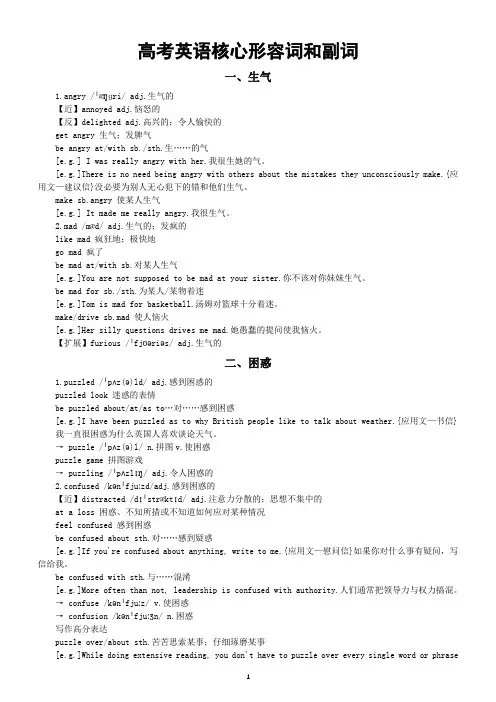
高考英语核心形容词和副词一、生气1.angry /ˈæŋɡri/ adj.生气的【近】annoyed adj.恼怒的【反】delighted adj.高兴的;令人愉快的get angry 生气;发脾气be angry at/with sb./sth.生……的气[e.g.] I was really angry with her.我很生她的气。
[e.g.]There is no need being angry with others about the mistakes they unconsciously make.{应用文—建议信}没必要为别人无心犯下的错和他们生气。
make sb.angry 使某人生气[e.g.] It made me really angry.我很生气。
2.mad /mæd/ adj.生气的;发疯的like mad 疯狂地;极快地go mad 疯了be mad at/with sb.对某人生气[e.g.]You are not supposed to be mad at your sister.你不该对你妹妹生气。
be mad for sb./sth.为某人/某物着迷[e.g.]Tom is mad for basketball.汤姆对篮球十分着迷。
make/drive sb.mad 使人恼火[e.g.]Her silly questions drives me mad.她愚蠢的提问使我恼火。
【扩展】furious /ˈfjʊəriəs/ adj.生气的二、困惑1.puzzled /ˈpʌz(ə)ld/ adj.感到困惑的puzzled look 迷惑的表情be puzzled about/at/as to…对……感到困惑[e.g.]I have been puzzled as to why British people like to talk about weather.{应用文—书信}我一直很困惑为什么英国人喜欢谈论天气。
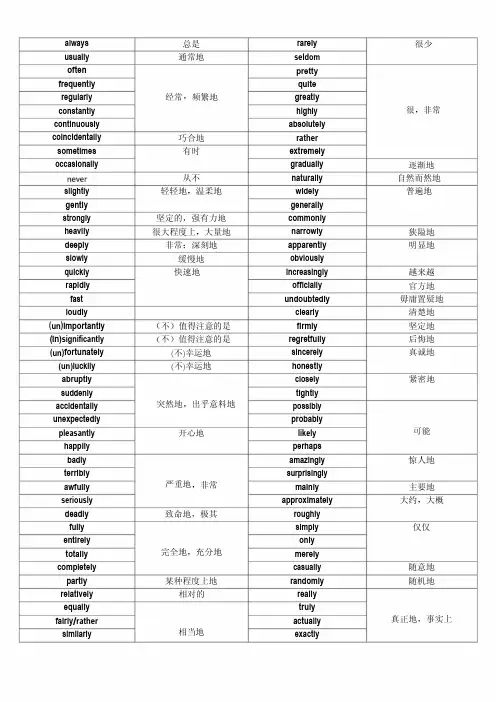
总是很少always rarely通常地usually seldomoften prettyfrequently quite经常,频繁地regularly greatly很,非常constantly highlycontinuously absolutely巧合地coincidentally rather有时sometimes extremelyoccasionally gradually逐渐地从不自然而然地naturally轻轻地,温柔地普遍地slightly widelygently generally坚定的,强有力地strongly commonly很大程度上,大量地狭隘地heavily narrowly非常;深刻地明显地deeply apparently缓慢地slowly obviously快速地越来越quickly increasinglyrapidly officially官方地毋庸置疑地fast undoubtedly清楚地clearlyloudly(un)importantly firmly(不)值得注意的是坚定地(in)significantly regretfully(不)值得注意的是后悔地(un)fortunately sincerely(不)幸运地真诚地(un)luckily honestly(不)幸运地紧密地abruptly closelysuddenly tightly突然地,出乎意料地accidentally possiblyunexpectedlyprobably可能pleasantly likely开心地happily perhaps惊人地badly amazinglyterribly surprisingly严重地,非常主要地awfully mainlyseriously approximately大约,大概deadly roughly致命地,极其仅仅fully simplyentirely only完全地,充分地totally merely随意地completely casuallypartly randomly某种程度上地随机地relatively really相对的equally truly真正地,事实上fairly/rather actually相当地similarly exactly尴尬地likewise with embarrassment with confidence 自信地激动地confidently excitedly 严肃地,认真地with patience 耐心地seriously patiently firmly 坚定地eagerly with determination in eagerness 困惑地with pride 骄傲地in confusion proudly 肯定地,当然令某人惊讶的是definitely。
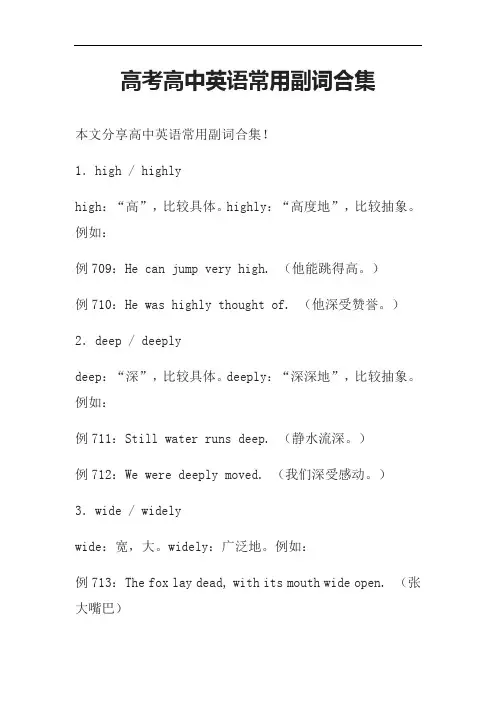
高考高中英语常用副词合集本文分享高中英语常用副词合集!1.high / highlyhigh:“高”,比较具体。
highly:“高度地”,比较抽象。
例如:例709:He can jump very high. (他能跳得高。
)例710:He was highly thought of. (他深受赞誉。
)2.deep / deeplydeep:“深”,比较具体。
deeply:“深深地”,比较抽象。
例如:例711:Still water runs deep. (静水流深。
)例712:We were deeply moved. (我们深受感动。
)3.wide / widelywide:宽,大。
widely:广泛地。
例如:例713:The fox lay dead, with its mouth wide open. (张大嘴巴)例714:The Chinese language is widely used. (广泛使用)4.late / latelylate:晚,迟。
lately:最近。
例如:例715:He came home late last night.例716:Have you heard from him lately?5.hard / hardlyhard:努力。
hardly:几乎不。
例如:例717:Work hard, and you’ll succeed.例718:We can hardly imagine that.6.near / nearlynear:在附近。
nearly:几乎。
例如:例719:I live near.(我住在附近。
)例720:Nearly 1,000 people were trapped in the fire. (将近有一千人被困大火中。
)7.close / closelyclose:靠近。
closely:紧紧地,密切地。
例如:例721:Come close to me. (请靠近我。

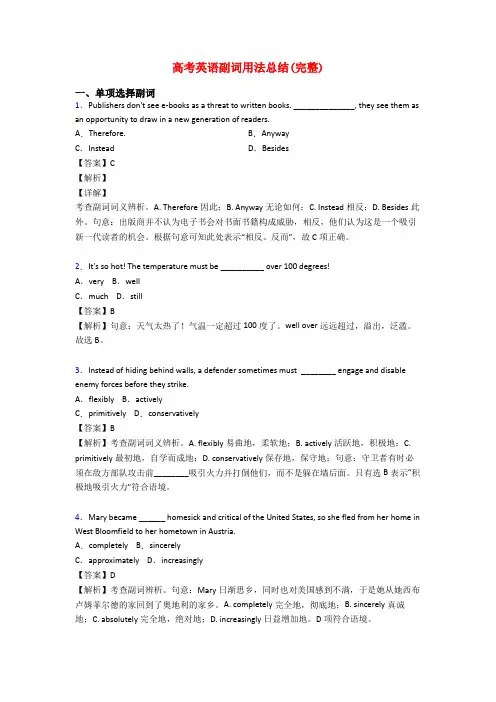
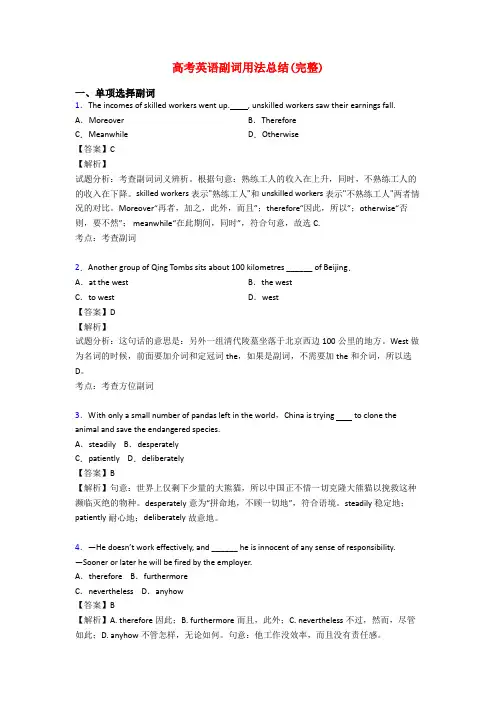
高考英语副词用法总结(完整)一、单项选择副词1.The incomes of skilled workers went up. , unskilled workers saw their earnings fall. A.Moreover B.ThereforeC.Meanwhile D.Otherwise【答案】C【解析】试题分析:考查副词词义辨析。
根据句意:熟练工人的收入在上升,同时,不熟练工人的的收入在下降。
skilled workers表示"熟练工人"和unskilled workers 表示"不熟练工人"两者情况的对比。
Moreover“再者,加之,此外,而且”;therefore“因此,所以”;otherwise“否则,要不然”;meanwhile“在此期间,同时”,符合句意,故选C.考点:考查副词2.Another group of Qing Tombs sits about 100 kilometres ______ of Beijing.A.at the west B.the westC.to west D.west【答案】D【解析】试题分析:这句话的意思是:另外一组清代陵墓坐落于北京西边100公里的地方。
West做为名词的时候,前面要加介词和定冠词the,如果是副词,不需要加the和介词,所以选D。
考点:考查方位副词3.With only a small number of pandas left in the world,China is trying to clone the animal and save the endangered species.A.steadily B.desperatelyC.patiently D.deliberately【答案】B【解析】句意:世界上仅剩下少量的大熊猫,所以中国正不惜一切克隆大熊猫以挽救这种濒临灭绝的物种。
高考英语总复习副词的种类及用法在句中修饰行为或状态特征的词称为副词。
副词的种类根据副词与句子的关系,英语中的副词可分为adjunct(附属)、disjunct(分离)、conjunct(连接)三类副词。
adjunct(位于句子内部的副词)时间副词:例1:He went home yesterday(他昨天回家了,yesterday修饰went)例2:I have just finished my homework.(我刚完成我的家庭作业)频率副词:例1:Do you often read English books?(你经常读英语书吗?)例2:I have never read such books.(我从没读过这样的书。
)地点副词:例1:He will study abroad next year(明年他将在国外学习)例2: He came in(他进来)方式副词:例1:Jack drives very carefully.(杰克开车很小心)例2:She slowly opened the present. (她慢慢地打开礼物)程度副词:例1:I am deeply grateful to you(我由衷地感激你)例2:I quite agree with your opinion(我相当同意你的观点)疑问副词:how,when,where,why例:How often do you see a movie(你多久看一次电影)关系副词:when,where,why例:This is(the place)where he was born.(这是他出生的地方)conjunct(连接两个句子的副词)连接副词:therefore(因此),moreover(此外),however,otherwise(另外的),then,when ,where,how,why……例1:We must be early; otherwise we won't get a seat(我们得早点走,否则我们就没有座位了)例2:Bicycling is good exercise; moreover, it won't pollute the air.(骑自行车是个很好的运动,此外它还不污染环境)disjunct(与句子分离的副词)句子副词(修饰整个句子):actually,certainly,clearly,definitely,evidently(明显地),fortunately,frankly,honestly,possibly,undoubtedly(的确地),unexpectedly(未料到地),finally 等undoubtedly,he is an expert in this field.(毫无疑问,他是这个领域的专家)frankly, you are wrong.(坦白说你错了)副词的位置一般原则:遇有be 动词或助动词时,副词均置于该be动词或助动词之后例1:He is always kind.例2:He can hardly walk(他几乎走不动了)1. 频率副词,置于一般行为动词之前He has never been late. 他从未迟到过。
高考英语重点连接副词用法归纳1. besidesbesides用作副词主要表示补充说明,意思是“此外”“而且”。
如:I don’t want to go shopping. Besides, I haven’t got any money. 我不想去购物,再说,我也没有钱。
She won’t mind your being late —besides, it’s hardly your fault. 她不介意你迟到——况且这也不能说是你的错。
2. howeverhowever主要用于转折或对比,意思是“然而”“可是”“但是”。
如:Some of the food crops failed. However, the cotton did quite well. 有些粮食作物长得不好,但棉花长得很不错。
His first response was to say no. Later, however, he changed his mind. 他最初的反应是不同意,但是后来他改变了主意。
3. insteadinstead主要表示取而代之,大意是“相对”“而是”,有时需根据具体语境来翻译。
如:It will take days by car, so let’s fly instead. 开车去要好几天呢,咱们还是坐飞机去吧。
My husband asked why I couldn’t just forget about dieting all the time and eat normally instead. 丈夫问我为什么就不能不整天想着节食,转而正经吃饭。
4. neverthelessnevertheless 主要表示对比或转折,意思是“尽管如此”“不过”“仍然”。
如:There was no news; nevertheless we went on hoping. 尽管毫无消息,我们仍抱着希望。
专题七·副词(Adverb)I 定义副词是用来修饰动词、形容词、副词或整句等的一类词,指在句子中表示行为或状态特征的词。
II 种类副词主要分为时间副词、频率副词、地点副词、程度副词、疑问副词等。
分类例词时间副词recently, ago, today, now, then, soon, lately地点副词here, there, downstairs, outdoors方式副词happily, directly, clearly, nicely程度副词much, enough, almost, very, so, quite, rather, too频度副词often, always, sometimes, once, twice, usually, seldom不定副词somewhere, anywhere, nowhere, everywhere疑问副词when, where, why, how关系副词when, why, where句子副词表递进:besides,further,then,moreover等表结果:therefore,consequently,accordingly,thus等表转折:though,instead,otherwise,however等表等同:similarly,equally等表对比:rather、oppositely等表概括:altogether、generally等表列举:first(ly)、second(ly)、finally等表同位:namely等表时间:meanwhile、sometimes、occasionally等表特指:mainly、mostly、particularly、especially等评论性副词luckily, honestly, hopefully, sadly 其他副词no, not, besides, thus, anywayIII 功能副词在句子中充当不同成分。
高考英语核心形容词副词一、公平1.fair /feə(r)/ adj.公平的it is fair to say that…可以说……[e.g.] It is fair to say that the Internet has changed people's life dramatically.议论文—互联网可以说互联网极大程度地改变了人们的生活。
→ fairness /ˈfeənəs/ n.公平→ fairly /ˈfeəli/ adv.相当地;公平地;简直→ unfair /ˌʌnˈfeə(r)/ adj.不公平的2.just /dʒʌst/ adj.公正的[e.g.] Be just to all, but trust not all.要公正对待所有人,但不要轻信所有人。
→ justice /ˈdʒʌstɪs/ n.正义→ justly /ˈdʒʌstli/ adv.公正地;正当地→ justify /ˈdʒʌstɪfaɪ/ v.证明合法→ justified /ˈdʒʌstɪfaɪd/ adj.有正当理由的;合乎情理的3.impartial /ɪmˈpɑːʃ(ə)l/ adj.公正的[e.g.] He is an impartial judge.他是位公正的法官。
→ partial /ˈpɑːʃ(ə)l/ adj.不公平的4.unbiased /ʌnˈbaɪəst/ adj.没有偏见的[e.g.] There is no clear and unbiased information available for consumers. 没有清楚公正的信息提供给消费者。
→ bias /ˈbaɪəs/ n.误差5.objective /əbˈdʒektɪv/ adj.客观的(不为个人偏见兴趣、感情或看法所左右)[e.g.] It's hard to give an objective opinion about your close friends. 很难对自己的好朋友作出客观的评价。
高考英语语法填空副词知识点与练习题高考英语语法填空副词知识点什么是副词副词(adverb)修饰动词、形容词和其他副词等,说明时间、地点、程度、方式等概念。
如:often往往,here这里,very很,quickly很快地。
副词的构成1)本身就是副词,如now现在,there那里,rather颇。
2)由形容词加词尾-1y变来,如firmly坚决地,happi1y幸福地。
3)与形容词同形early adj. 早的 early adv. 早high adj. 高的 high adv. 高高地long adj. 长的,长久的long adv. 长久地副词的种类副词可分为下列几种:1)普通副词(ordinary adverb)如:together一起,well好,seriously认真地,slowly慢,carefully小心地。
2)疑问副词(interrogative adverb)如:when何时,where何地,how如何,why为何。
3)关系副词(relative adverb)如:where,when。
4)连接副词(conjunctive adverb)如:then然后,so所以,there{ore所以,however然而,hence所以,thus这样,nevertheless然而,otherwise否则,still可是,仍然。
副词的用法副词在句中可用作:1)状语(这是副词在句子中的主要功用)It is raining hard.雨下得很大。
(副词hard作状语,修饰动词is raining。
)Don't drive too fast.车子不要开得太快。
(fast是副词,作状语,修饰动词drive,副词too又修饰副词fast。
)He speaks English quite well.他英语讲得相当好。
(well修饰动词speaks,quite又修饰副词well。
)This is a fairly useful tool,这是一件相当有用的工具。